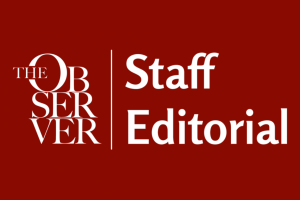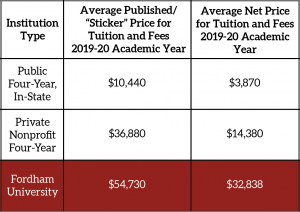Court Rules Against Fordham Student in Class Action Lawsuit for Tuition Reductions During Pandemic
“Online learning options offered are subpar in practically every aspect,” the student who filed the lawsuit said
DANIEL BONE VIA PIXABAY
In January, Fordham won a class action lawsuit filed by Kareem Hassan, FCRH ’21, who called for a tuition refund following a lower quality education due to online learning.
February 10, 2021
Fordham University won a class action lawsuit in January 2021, dismissing the calls for refunds on tuition and campus-related fees following the suspension of in-person classes due to the coronavirus pandemic.
The plaintiff, Kareem Hassan, Fordham College at Rose Hill ’21, filed the class action lawsuit in April 2020 after classes shifted to online learning and he was unable to access laboratory facilities. As an undergraduate student majoring in chemistry, Hassan said he believed that he was not able to receive the same quality of education that he paid for in order to further his education.
“Online learning options offered are subpar in practically every aspect, from the lack of facilities, materials, and access to faculty,” Hassan claimed in the lawsuit. “Students have been deprived of the opportunity for collaborative learning and in-person dialogue, feedback, and critique.”
Hassan represented his fellow students as a petition circulated around Fordham demanding a response. Hundreds of students signed the petition and several Fordham families added to the request for lowering tuition costs and removing added on-campus fees. The university did not alter the cost of tuition.
“What else can we expect from a private university that has always prioritized profits, reputation, and maintaining order?” Tess Gutenbrunner, FCLC ’21
“Fordham University has proven once again that they are incapable of standing for what is right in the name of their students,” Tess Gutenbrunner, Fordham College at Lincoln Center (FCLC) ’21 and an organizer of the petition, said. “No one actually thinks that the quality or level of education we are getting online, regardless of the thankless work and struggle of our professors, is anywhere near worth what it was before the pandemic.”
Gutenbrunner, along with several fellow petition organizers, voiced her opposition to Fordham’s financial response to the coronavirus pandemic as the institution neglected to recognize the impact the pandemic had on its students.
“Fordham uses any and all legal, financial, and biblical justifications for these tuition charges. What else can we expect from a private university that has always prioritized profits, reputation, and maintaining order,” Gutenbrunner said.
Insiya Gandhi, FCLC ’24, said she was pleasantly surprised by her first semester of college courses and was proud of the efforts her professors made to ensure that the virtual learning modality was not burdening students.
Regarding the university’s efforts in accommodating the financial burdens of its students and faculty, Gandhi said that she believed the university showed a lack of concern.
“Although I have no prior college experience to compare my virtual learning semester to, I know that it is not even vaguely equivalent to what an in-person, non-covid semester would be like,” Gandhi said. “I know that I should not be charged added lab fees to my tuition bills for online classes. Given all the financial hardships families are enduring due to the pandemic, I believe that the added fees are unfair and inconsiderate of the economic situation that has beset Fordham students.”
“None of these statements, however, constitutes a specific promise on Fordham’s part to provide ‘certain specified services.’” Kimba M. Wood, United States District Judge
Bob Howe, vice president for communications, said that the university believes the case was correctly decided.
“Since March of 2020, thanks to the hard work and student-centered creativity of our faculty, Fordham balanced the imperative to protect the health and safety of the campus community with our mission to deliver a high quality education, regardless of teaching modality,” Howe said.
Hassan claimed that his courses were selected based on their modality being in-person and that the “on-campus experience” is a benefit of enrollment. The U.S. District Court for the Southern District of New York responded by saying, “None of these statements, however, constitutes a specific promise on Fordham’s part to provide ‘certain specified services.’”
The court ruled in Fordham’s favor; a motion to dismiss the case was granted due to the plaintiff’s failure to make a claim. A “plaintiff’s obligation to provide the ‘grounds’ of (their) ‘entitlement to relief’ requires more than labels and conclusions.”














